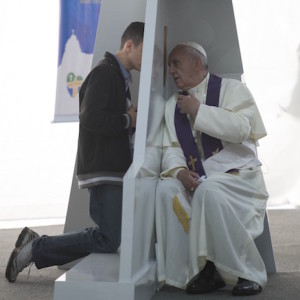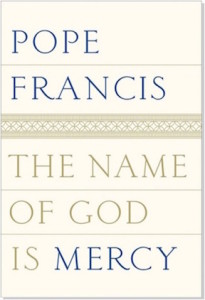Andrea Tornielli, an Italian journalist who puts questions to Pope Francis in the just published book/interview The Name of God is Mercy, raises a crucial point midway through this short text: “Sometimes, even from the Church, we hear ‘Too much mercy! The Church must condemn sin.’”
If anything still unites the various faith groups claiming the name Christian – and it’s not clear there is – it may be the complaint that we’ve lost a sense of sin. There’s the current ecumenical emphasis on God’s love, but also many disputes about what love means and how it works. Between the decline of “sin” and rise of “love,” Christians today often feel their churches are not much different from Baby-Boomer Buddhism, or New Age groups offering a comforting cocoon of vague cosmic consciousness.
But hear Pope Francis, “The Church condemns sin because it has to relay the truth, ‘This is a sin.’ But at the same time it embraces the sinner who recognizes himself as such, it welcomes him, it speaks to him of the infinite mercy of God.” [Emphases added.] Here, in a nutshell, is the whole book: a perhaps surprising condemnation of sin in the name of truth by Pope Francis, the welcoming of the sinner who understands what he is, and the offer of mercy.
All fundamental Catholic teachings. But it’s the relative emphases and the “Francis effect” that have caused confusion and controversies. For instance, recent reports from Italy and elsewhere that Francis’ Year of Mercy has led to a decline in Confessions. People somehow have the impression they no longer need sacramental absolution. Some that do still come resist even gentle priests who impose penances: “who are you to judge me” or “I don’t have time for all that, besides God understands.”
Francis argues, citing Jesus’ own words:
“Whose sins you forgive are forgiven them, and whose sins you retain are retained” (John 20: 19-23). Therefore, the apostles and all their successors – the bishops and their colleagues the priests – become instruments of the mercy of God. They act in persona Christi. This is very beautiful. It has deep significance because we are social beings. If you are not capable of talking to your brother about your mistakes, you can be sure that you can’t talk about them with God, either, and therefore you end up confessing into the mirror to yourself.
The media have filtered out this side of Francis (his frequent missteps, lack of clarity, and systematic incoherences haven’t helped).
But Francis does not stop at “mistakes,” as in the passage above. He works out a fairly substantial explanation of why we need the grace to recognize that we’re sinners: “Without that grace, the most one can say is: I am limited, I have my limits, these are my mistakes.” But recognizing oneself as a sinner is something else. It means standing in front of God and asking for what only he can do in forgiving and helping us.
Francis has repeatedly both encouraged Confession and said that it is not “dry cleaning.” Not merely a mechanical process for removing stains; we need to change who we are, something much more radical.
All perfectly traditional Catholic teaching, and the mystery is why, despite what he says, something else gets communicated. Partly it’s because he devotes little space to such reflections, much more to mercy, even here, so that it seems like the Church is all mercy, all the time.
The Church must, of course, proclaim that Jesus loved us so much that he willingly died on the Cross for us. But to be fully faithful to Him, it must also recall that He calls own disciples evil, warns about the strait gate that leads to eternal life and that few find it. And about the eternal fires of Gehenna. For decades now, the Church has been preaching essentially Francis’s message, and people not only don’t repent and confess. They leave in ever larger numbers.
Biographies of the pope haven’t explained why he seems so fixated on repudiating “rigid” Catholics, since they’re a small minority, even among regular churchgoers. In his homily to the thousands who came to Philadelphia from around the globe for the World Meeting on Families, for instance, he warned against rigidity and legalism, which – to say the least – seemed inappropriate for that crowd.

In the book, Francis provides other examples of the rigidity he finds objectionable. The “scholars of the law,” above all, the ones who, because they know a lot about theology, philosophy, or ethics, think they’re not themselves sinners. We’ve all met these types, liberals and conservatives; it’s been a commonplace in moral theology, since the universities were first founded in the Middle Ages.
The problem with this example, though, is that he also comes close to saying that study and law are themselves perhaps a distraction. “Scholars” wrongly go into libraries and “consider pros and cons,” not out to the peripheries and help people. But the Church is large, as large as the world, and it needs all sorts of people (cf. 1 Cor. 12) to reach that world. Were Aquinas or Francis de Sales or Newman morally deficient because they didn’t focus on corporal works of mercy? Put that way, Francis wouldn’t say so, but gives that impression.
Other examples are also heartfelt, but not particularly persuasive: the priest handling an annulment who brusquely asks for $5000 upfront; the pastor who refuses a church funeral for a newborn who died before it could be baptized? Such cases exist, but are so few amidst massive other sins and disorders that it’s hard to see why they should bulk so large (John XXIII, Paul VI, John Paul I and II, Benedict XVI all affirmed mercy without displacing so much else in Catholic thought) in the Church at this moment.
Still, read The Name of God is Mercy to better understand Pope Francis and what he’s about. (The Bull of Indiction for the Holy Year appears in an appendix.) Even if you believe there’s much else that the Church urgently needs to bring into the world today, he’ll make you think more deeply about your own hardness of heart and failures to show mercy.
You can buy The Name of God is Mercy at The Catholic Thing store at Amazon.
















